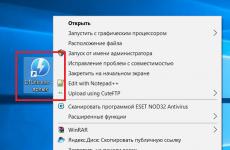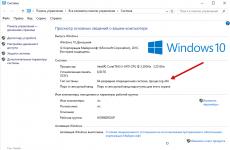Do you need an antivirus? Do you need an antivirus?
Windows Defender is essentially newest version, Microsoft's free antivirus first written for . It's now built right into the operating system, giving all Windows 10 computers a basic level of antivirus protection.
Is Windows Defender Good Enough?
Antivirus is enabled by default. Windows Defender automatically scans all launched programs and downloads database updates through the Center Windows updates(Windows Update) and has an interface for deep system scanning.
But how good is this antivirus? We have to admit: Microsoft's development is a little behind its competitors in comparative tests of antivirus software. We have expressed concern about this before - all the more serious because in the past Microsoft antivirus we really liked it.
Windows Defender has many benefits. It's built-in, doesn't bother you with pop-ups, doesn't cost you money, and uses fewer system resources than some competing antiviruses. It doesn't try to collect data from a user's web surfing and profit from it, as some free antivirus programs now do.

Overall, Windows Defender provides decent protection. As long as you update Windows regularly (which now happens automatically), use a modern browser, and avoid potentially dangerous plugins like Java, you should be fine. Combined with standard security practices that you should follow anyway, Windows Defender does its job well.
Despite the low score that Windows Defender received in the June 2015 test (just “0.5/6” for protection), the program was able to recognize 95% of “widespread and dominant threats”, as well as 85% of zero-day attacks. recognized 100% of test samples in both directions, and 100% of common viruses and 99% of zero-day attacks. So despite the difference in scores, Windows Defender still does a pretty good job. In the past, Microsoft representatives noted that the program focuses on really common threats, while the tests are unrepresentative, and antiviruses from other manufacturers are optimized specifically for passing the tests. However, now Microsoft representatives no longer comment on the test results.
Windows 10 has other protections carried over from Windows 8, in particular, which prevents malware from downloading and running, regardless of which antivirus is used. And Chrome and Firefox also have Google Safe Browsing, which blocks the download of many malware.
For most users, Windows Defender will be sufficient - with common sense and good security habits. But if you regularly download pirated software and engage in other risky activities, it is better to abandon Windows Defender in favor of some other program that copes more effectively with antivirus test samples.

Use MalwareBytes Anti-Exploit
We also recommend using exploit protection software to protect your browser and plugins that are most often attacked. We recommend free program. It works much the same as Microsoft's own EMET utility, but is more convenient and has more security features. With its help, you can block the most common exploits, even previously unknown zero-day attacks. For example, MalwareBytes Anti-Exploit would do a good job of blocking all the zero-day Flash attacks that have been reported recently. The program strengthens the security of the browser, plugins, and other favorite attack surfaces by protecting against the most common types of attacks, rather than protecting against all known malware samples.
| Materials |
We all know very well what antivirus software is. software. In the age of the Internet, there were an unimaginably large number of virus programs. That is why security software will never lose its relevance as long as it exists virtual network. Almost every user of a PC, laptop, tablet, or smartphone has encountered problems with viruses on their computer.
Since Android smartphones have been actively used over the past 10 years as full-fledged pocket computers, the question of whether an antivirus is needed for Android should not be raised. However, a huge number of owners of touch gadgets are interested in this.
Finding free security software for your phone is easy. If you download an antivirus and follow some recommendations, you will be 90% protected from malware.
Android itself checks the phone for threats
Android OS has built-in antivirus functions. What does this mean? About the fact that before installing an antivirus you should check the protective capabilities of your smartphone:
- Appendixes B Play Store checked for viruses. When you upload a new application to Google Play, it is automatically checked for malicious code, the checking service is called Bouncer. Bouncer scans your code and will easily detect known viruses, trojans, and other malware.
- Google Play has the right to remove the application from your phone after you have installed it: if someone has uploaded their program to the Play Market. But later it turned out that the development contains a virus, then Google will delete this application from your phone remotely.
- Android 4.2 has the ability to scan applications that were not downloaded from the Google store: as you already understood, every new application in Goggle Play is scanned for viruses. But Google does not scan third-party software downloaded from other sources. So, when you first install an application on Android 4.2, not from Play Market, you will be prompted to scan the program for malicious code. Be sure to agree, click “Yes” or “Ok”, “I Agree”... By doing so, you will protect yourself from viruses entering your phone.
- Android 4.2 also has the ability to block the sending of paid SMS: the Android operating system is designed in such a way that it does not allow sending SMS to short numbers. This is due to the fact that many Trojans work this way. If such an application tries to send such a message, you will receive an alert.
Where do Android viruses come from?
Until the release of Android 4.2, the operating system had very few security features. All the user could afford were Google Play tools. That is, when downloading applications from the Play Market, there was no need to worry about security, but third party programs from browsers could well disrupt the laconic performance of the smartphone.
According to official research, it has been revealed that 60+% of Android malware is FakeInstaller code. This malicious program disguises itself as an application you need and is posted for download on a website that was created specifically to harm your device. After the download occurs, the application will send paid SMS from the number without your participation (you will not know anything) mobile phone. A mature version of Android 4.2 will likely detect malicious code in the new installed application with built-in FakeInstaller.
In general, you must understand one thing: on Android you are protected if you download all applications from Google Play. According to statistics, the amount of malware in the Google store is 0.5% of the total.
Do you need an antivirus for Android?
The majority of viruses enter our smartphone from places where we want to download an application with attractive conditions. For example, in the Market it is paid, but on the Internet you found it free. Or, it is only supported by Apple products, but you have Android, and there is a unique offer on the Internet.
In general, we can say that everything depends on your attentiveness. Don't install suspicious games or programs and everything will be fine.
If there is high activity on the network and constant downloads, it is better to have an antivirus. It is especially important to download security software if you are using an old Android version, lower than 4.2.
Which antivirus to install on Android
Decided to install an antivirus on Android, then you will have to choose one from the list below. When you type “antivirus” into the Play Store search, you will get a result in the form of the five most popular security software. On this moment the search returns the following programs:
- Dr.Web Light Antivirus;
- Dr.Web Light Antivirus;
- Hi Security;
- Avast;
- Mobile Security;.
What exactly should you choose? It's impossible to say for sure. But I am more inclined towards the proven, strong Kaspersky antivirus.
Kaspersky Mobile Antivirus
Constantly developing Anti-Virus with a worldwide reputation and an ideal reputation. Every year it improves its protection, finding more and more new viruses. Perfect for those who don’t want to mess with security software, but just want to install it and forget it.

By installing Kaspersky Anti-Virus, the user receives a shield against all kinds of viruses, Trojans, spyware, rootkits, adware...
Dr.Web
Doctor Web is a universal tool that will protect your smartphone, iPhone, computer, tablet or laptop. At the same time, it can be installed on Windows, macOS, Linux.

Can be used free version, and if you wish, purchase a license and completely secure your phone.
Hi Security
Hi Security is absolutely free mobile app, which cleans, speeds up and protects your device. A huge number of Android users appreciate this software.

What you can expect when downloading Hi Security:
- Complete virus protection
- High-quality charging
- Garbage cleaning
- Smartphone acceleration
- The processor will not overheat
- Saving confidential data
- Blocking unwanted calls
- Proactive blocking of virus applications
- Convenience and safety when using WiFi
AVAST Mobile Security

A popular security application that is one of the most affordable highly effective antiviruses. The company positions itself something like this: Avast Mobile Security is the most reliable and free antivirus in the world for smartphones on the Android platform.
It is used by hundreds of millions of people all over the planet, and this is an indicator!
Mobile Security

Antivirus software with premium version. You get it free for 30 days, after which you will need to pay for a subscription. Or, you can use the basic version. It is completely free and unlimited.
Features of mobile antiviruses for Android OS
Antivirus is a development that definitely deserves respect. The article mentioned such protection features as detecting malicious code and preventing the sending of paid SMS. But antiviruses are also capable of other things:
- Phone detection if the device is lost;
- Detailed reports on smartphone use and security;
- Firewall functions (activity tracking);
Well, that’s about all I would like to say regarding the question of whether an antivirus is needed for Android. What conclusions should we have drawn? Firstly, an antivirus is required if you actively use the browser. Secondly, if you want to completely protect yourself, then even when downloading applications from the store, the antivirus must work. Thirdly, perform periodic checks and updates to ensure that the operating system is in satisfactory condition.
This question has come up repeatedly in the forum and blog comments, and last week reader Igor asked me it in an email. Moreover, the letter arrived at the moment when I was reading the latest Microsoft security report for the second half of 2012. This coincidence is noteworthy because it was the aspect of working without up-to-date anti-virus protection that came into the focus of the company’s specialists this time.
I suggest you look at the big picture of working without an antivirus in Windows, and also figure out whether an antivirus is necessary for advanced users.
Today on the program
Statistics of infections of various Windows operating systems
Regular readers of the blog are already familiar with posts in which I analyzed interesting facts from Microsoft security reports, for example, for the second half of 2011 and the first half of 2012. Compared to the second one, little has changed:
- Vulnerabilities in Java and Adobe are exploited many times more actively than vulnerabilities in Windows.
- The passion for freebies is not abating, and the most popular family of malware remains Win32/Keygen.
- Russia firmly holds fourth place in the world in terms of the number of infected PCs, and the level of malicious and phishing sites in the country is 1.5 times higher than the world average.
And even the statistics of Windows OS infections do not bring any surprises, despite the appearance of Windows 8 on the list. The jump in the level of Windows XP infections in the fourth quarter of 2012 is associated with the explosive growth in the activity of the fake Win32/OneScan antivirus in Korea. Let me remind you that the level means the number of PCs with detected malware for every thousand computers scanned by MSRT.
Such a low level of Windows 8 infections is explained primarily by the fact that so far only enthusiasts with a higher level of computer literacy have switched to it. They also tend to consciously choose 64-bit systems equipped with security technologies that are not available in 32-bit OSes.
But there is another factor that will contribute to the fact that future of Windows 8 will demonstrate an infection rate lower than that of Windows 7. This is a built-in Windows antivirus Defender, which has the same interface, engine and update databases as Microsoft Security Essentials, intended for previous versions Windows.
Windows OS infection statistics through the prism of antivirus availability
In principle, Captain Obvious suggests that with an antivirus the likelihood of infection is lower than without it. However, isn't it interesting to look at the specific statistics collected by MSRT from millions of PCs?
In its report, Microsoft uses the term “unprotected PCs,” referring to systems on which the antivirus is not installed or is running with outdated databases. As it turned out, in the second half of 2012, this category fell every fourth PC!
Not surprisingly, unprotected PCs (red graph) were infected on average 5.5 times more often than systems with updated antiviruses (green graph).
The breakdown of unprotected PCs by operating system is also interesting. To be honest, I expected an even higher level of infections on Windows XP. But I was not at all surprised that owners of Windows 7 without SP1 are irresponsible not only about updating the OS, but also about the presence of anti-virus protection.
Note that Windows 8 has the lowest rate of unprotected PCs, thanks to the presence of Windows Defender.
However, 7-8% of people manage to disable the built-in antivirus protection of Windows 8 without installing anything in its place!
Finally, take a look at the breakdown by operating system and bitness in the context of having an up-to-date antivirus. Unprotected PCs are indicated by shading, while protected PCs are indicated by solid shading.
As expected, systems without proper protection become infected more often, regardless of version and bit depth. In particular:
- Windows XP 4.7 times
- Windows 7 SP1 9.4 times (x86) and 7.3 times (x64)
- Windows 8 x64 13.5 times
Adherents of Windows XP are unlikely to resist the conclusion that the old OS is almost three times more resistant to infections when running without an antivirus than Windows 8. However, I see two factors that make this judgment somewhat superficial.
- An infection is a detected malicious program, but it is not at all a fact that it can harm a specific operating system. A classic example is the INF/Autorun family, which is included in all attack kits, but does not pose any threat to Windows 7 and newer operating systems (as well as to Windows XP with the update installed).
- Windows 8 just came out, that is. installed completely on everyone PC. What do people do after installing the OS? That's right, they install programs. Now remember about the irrepressible passion for freebies, and everything will fall into place.
Win32/Keygen and INF/Autorun were the most widespread malware families throughout 2012 (with the exception of the DealPly adware spike in Brazil in the fourth quarter).
In the table below, the same families are ranked by ranking for each OS. Please note that Keygen and Autorun occupy the top three spots on Windows 8.
Do experienced users need antivirus?
The above data clearly confirms that the presence of up-to-date antivirus protection significantly reduces the level of infections in the Windows ecosystem as a whole. In other words, the vast majority of users absolutely need an antivirus.
I have always emphasized the benefits of following Microsoft's recommendations, which in this case expressed in the support center. However, there is a category of people who consider themselves experienced enough to avoid infection without a resident antivirus (well, maybe only catch ransomware once a year :)
This one time is where there is a higher likelihood of losing personal data, which can cause damage to finances or reputation.
Of course, no antivirus provides 100% protection against malware. Even if we exclude serious 0-day vulnerabilities, which are more likely to be used in targeted attacks like Aurora, security software vendors are delayed in responding to any new threats.
However, antivirus plays an important role in a set of measures that work in real time and increase Windows' resistance to infections:

I believe that an experienced user uses the entire defensive arsenal without neglecting any weapons.
However, there is one approach that can justify working without an antivirus.
Alternative: SRP or AppLocker
Windows has technologies to control the execution of executable code.
The Windows 10 operating system today is the most popular OS in the world, running more than 300 million modern devices, from computers to game consoles Xbox One. A couple of years ago, the American corporation Microsoft developed a built-in antivirus called Windows Defender, which is enabled by default on absolutely all computers running the Windows 8 operating system and newer versions.
When Windows Defender first became available, many assumed that Microsoft would deal a crushing blow to all antivirus programs and services that specialize in combating malware. Several years have passed since then, and the branded Windows Defender has been updated several dozen times during all this time. In other words, the American corporation had several years left to make it a professional solution that protects users from all threats.
However, according to a Tech Magazine study, the built-in antivirus in Windows 10 is simply terrible because it works "satisfactorily." When it comes to security in the information environment, such security indicators are simply unacceptable, since the majority of users still remain at risk. After testing, we were able to obtain the following results on the effectiveness of the most popular antivirus solutions:
- Bitdefender Total Security – 93 points
- Kaspersky Total Security - 100 points
- Avast Premier – 89 points
- Windows Defender – 60 points
As you can easily see, antivirus software from Kaspersky Lab absolutely always detects a threat and offers options for eliminating it. As for Windows Defender, it copes with its task extremely poorly, since it cannot recognize almost every second virus or Trojan. In this regard, experts have concluded that the Windows 10 operating system has a simply terrible antivirus built into it, which, to achieve maximum security, should be immediately disabled and then started using third-party solutions.
The only advantage of the antivirus from Microsoft is that it is available completely free, while for all its competitors you have to pay money - about $50 annually. However, all this is more than compensated for by the cost of the operating room. Windows systems 10, which is sold in stores for more than $180 or 10,000 rubles.
Until July 14 inclusive, everyone has the opportunity to use Xiaomi Mi Band 4, spending only 1 minute of their personal time on it.
Join us on
More and more often, I come across the opinions of people and “experts” who claim that an antivirus is not needed on a computer and all it does is slow down the computer, eating up its resources. There is an opinion that an antivirus behaves just like a virus, so it deserves a similar attitude, that is, it must be ruthlessly destroyed.
Another argument “AGAINST” an antivirus is often given by the fact that at some exhibition or security seminar, a bunch of programmers bypassed antivirus protection in five minutes, showing the whole world that this is a useless program, and the antivirus software industry is a well-established business.
Of all the above, I only agree with the last one - this is indeed a business, but what is not a business? After all, you bought a computer, and this is also a huge business... but let’s not go away from the topic... I want to give my reasons why I consider all of the above to be incorrect and ALWAYS recommend that ALL, especially novice users, use anti-virus protection.
So, let's go...
The computer world is just a reflection of our real world, so let's draw parallels. Your computer is your apartment, in which your documents, photographs, films, personal information, possibly confidential information in the form of credit card numbers or electronic wallet numbers are stored, that is, essentially money. Do you agree?
Do you have valuables in your real apartment? Money, documents, jewelry? Are you protecting your apartment from outside penetration? Right?
We install a metal door with two locks, or even more than one, we hang bars on the windows, we pay the grandmother-concierge to sit downstairs in the entrance, we pay for a video surveillance system in the entrance and for a combination lock on the front door.

All these activities reduce the risk of being robbed and no one will argue with this, but here’s an example.
My friends were robbed about five years ago. The apartment is on the seventh floor of a new building. A metal door, a camera on the landing, a grandmother-concierge below. That is the standard package. It seemed that the thieves did not have much time or were scared off by something, so they took what was lying on the surface. The police officer who responded to the call said that any professional thief can pick 90% of all locks in less than a minute! It will take 2-3 minutes to rummage around with some other part, and only a few types of locks are able to protect against such penetration, since opening them will require considerable time, which house thieves do not have...

Conclusion - why do we put locks on doors if there is a 90% chance that any professional thief will open them? However, no one has the desire to remove the lock or save money on it or a metal door, leaving just a plywood board on hinges as the entrance to the apartment? Why are we doing this? And then, that such basic protection will protect us from punks who can try to get into the apartment after seeing its poor security. Of all the thieves, there are not so many truly professionals. Mostly they are operated by “amateurs”, whom such protection is quite capable of stopping. Well, professionals usually carefully select a victim in order to get the maximum profit from breaking into an apartment.
Do you follow the train of thought?
Having an antivirus on your computer will not protect you from a professional, but it can easily repel attempts by amateurs to penetrate your system. There are very, very few professional hackers who hack computers and steal information, who can bypass any antivirus in five minutes, and, believe me, they are more interested in hacking much more serious computer systems than your computer. They are paid exorbitant amounts of money either by software companies to find vulnerabilities in programs, or by other people to hack systems and steal commercial information.

It is useless and unnecessary to protect yourself from such hackers, since I already said, they are not interested in you. You need to protect yourself from pimply youngsters who, having watched enough Hollywood blogbusters, imagine themselves to be super hackers and rush to write viruses and send out Trojans. Such unfortunate craftsmen are a dime a dozen and their attempts are very well weeded out by specialized protection programs. These programs are a metal door with locks, and their additional options are a video surveillance system, a combination lock and a granny concierge.
Without any protection, you simply risk getting a completely standard virus, spyware or Trojan on your computer with all the ensuing consequences. And reasoning like “I don’t download files from Vareznik”, or “I don’t open attachments in e-mail“and that’s why I’m supposedly in no danger; in today’s realities they sound like baby talk. You just need to go to a completely harmless-looking site with a malicious script and the Trojan will begin its work. Besides, don’t forget, you can bring the virus on a flash drive and not even on your own...
My opinion is that anti-virus protection is not needed only in one case - removable storage media are not connected to the computer and it does not have access to the Internet - that is, it is a closed system into which nothing comes from the outside.
In all other cases - Anti-virus computer protection is simply a MUST!!!
This is especially true for beginners and users who are not very confident in their abilities. If a person already assesses the risks quite adequately, then he can do whatever he wants - that is, he can do without protection at all. But if you do not consider yourself a confident user, then do not listen to these would-be advisers and install anti-virus protection.
This is my opinion and I hope that I have fully substantiated it.





